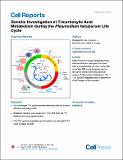| dc.contributor.author | Ke, Hangjun | |
| dc.contributor.author | Lewis, Ian A. | |
| dc.contributor.author | Morrisey, Joanne M. | |
| dc.contributor.author | McLean, Kyle J. | |
| dc.contributor.author | Painter, Heather J. | |
| dc.contributor.author | Mather, Michael W. | |
| dc.contributor.author | Jacobs-Lorena, Marcelo | |
| dc.contributor.author | Vaidya, Akhil B. | |
| dc.contributor.author | Maddur Ganesan, Suresh | |
| dc.contributor.author | Llinas, Manuel | |
| dc.date.accessioned | 2016-03-14T23:29:34Z | |
| dc.date.available | 2016-03-14T23:29:34Z | |
| dc.date.issued | 2015-04 | |
| dc.date.submitted | 2015-02 | |
| dc.identifier.issn | 22111247 | |
| dc.identifier.uri | http://hdl.handle.net/1721.1/101701 | |
| dc.description.abstract | New antimalarial drugs are urgently needed to control drug-resistant forms of the malaria parasite Plasmodium falciparum. Mitochondrial electron transport is the target of both existing and new antimalarials. Herein, we describe 11 genetic knockout (KO) lines that delete six of the eight mitochondrial tricarboxylic acid (TCA) cycle enzymes. Although all TCA KOs grew normally in asexual blood stages, these metabolic deficiencies halted life-cycle progression in later stages. Specifically, aconitase KO parasites arrested as late gametocytes, whereas α-ketoglutarate-dehydrogenase-deficient parasites failed to develop oocysts in the mosquitoes. Mass spectrometry analysis of [superscript 13]C-isotope-labeled TCA mutant parasites showed that P. falciparum has significant flexibility in TCA metabolism. This flexibility manifested itself through changes in pathway fluxes and through altered exchange of substrates between cytosolic and mitochondrial pools. Our findings suggest that mitochondrial metabolic plasticity is essential for parasite development. | en_US |
| dc.language.iso | en_US | |
| dc.publisher | Elsevier | en_US |
| dc.relation.isversionof | http://dx.doi.org/10.1016/j.celrep.2015.03.011 | en_US |
| dc.rights | Creative Commons Attribution | en_US |
| dc.rights.uri | http://creativecommons.org/licenses/by-nc-nd/4.0/ | en_US |
| dc.source | Elsevier | en_US |
| dc.title | Genetic Investigation of Tricarboxylic Acid Metabolism during the Plasmodium falciparum Life Cycle | en_US |
| dc.type | Article | en_US |
| dc.identifier.citation | Ke, Hangjun, Ian A. Lewis, Joanne M. Morrisey, Kyle J. McLean, Suresh M. Ganesan, Heather J. Painter, Michael W. Mather, Marcelo Jacobs-Lorena, Manuel Llinas, and Akhil B. Vaidya. “Genetic Investigation of Tricarboxylic Acid Metabolism During the Plasmodium Falciparum Life Cycle.” Cell Reports 11, no. 1 (April 2015): 164–174. | en_US |
| dc.contributor.department | Massachusetts Institute of Technology. Department of Biological Engineering | |
| dc.contributor.mitauthor | Maddur Ganesan, Suresh | en_US |
| dc.relation.journal | Cell Reports | en_US |
| dc.eprint.version | Final published version | en_US |
| dc.type.uri | http://purl.org/eprint/type/JournalArticle | en_US |
| eprint.status | http://purl.org/eprint/status/PeerReviewed | en_US |
| dspace.orderedauthors | Ke, Hangjun; Lewis, Ian A.; Morrisey, Joanne M.; McLean, Kyle J.; Ganesan, Suresh M.; Painter, Heather J.; Mather, Michael W.; Jacobs-Lorena, Marcelo; Llinas, Manuel; Vaidya, Akhil B. | en_US |
| dc.identifier.orcid | https://orcid.org/0000-0002-7779-2216 | |
| mit.license | PUBLISHER_CC | en_US |
